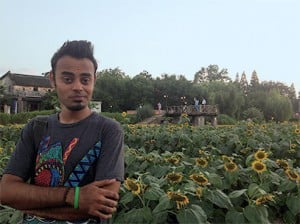As our Fulbright-MTP participants make their way to Portland for tomorrow’s launch of the MTP 2014 journey, they reflect on their Fulbright experience thus far, what they believe are the most pressing issues facing global Millennials today and how their Fulbright-MTP project is a vehicle for enhancing mutual understanding between the people of the United States and the people of other countries.
In the words of Anser Shaukat, a Fulbright Foreign Student from Pakistan:
It’s been two years since that bright eyed lad stepped out of Logan, on what he would later learn, is considered a particularly bright and beautiful day in New England.
As I sit now preparing for my upcoming journey in the Millennial Trains Project, excited about discovering the varying cultural landscapes of the U.S, I can’t help but think about that boy and my first experience in the landscape of Boston.
My plan was to take the bus-tram hybrid, the Massachusetts Bay Transportation Authority’s (MBTA) Silver Line to South Station and from there transfer to the bus to New Bedford, my final destination. I thought I had done my research, looked up the times and the routes, but I was in no way prepared to handle the unique challenges offered by a new city. I huffed and puffed my three pieces of brand new luggage on the Silver Line, which right up until that moment were my trophies of readiness; Two years of life in the land of the free, packed in two pieces of checked baggage and one hand carry. A hundred and thirty pounds; barely under the weight limit. The inevitability of the situation makes me laugh at that boy and the pride he had in those bags. He had felt ready then, prepared to take on the new world and his new life.
My instincts had taken hold of me as I stood by my baggage on the crowded Silver Line, keeping the sharp eye of a Karachi kite, wary of any thieving crows who might steal its trophy. It wasn’t until I had reached South Station itself that I realized, living in a city bigger than New York my whole life, would do nothing to save me from the strange winds of a foreign Boston.
Standing in the labyrinth of people, all of whom seemed to have the cheat sheet of where to go and how to get there, I was overcome by a medley of emotions. I felt like a lost puppy looking around for anyone who might help it find its new home. Inspiration came when I saw the exit sign shining red above the cage like turnstile. The only way for me to get through was to abandon the instincts I had developed as a Karachiite. I would have to take my luggage through the cage one piece at a time, leaving the rest unattended; something no careful Karachiite would attempt.
The second I crossed the barrier with my hand carry my mistake became obvious to me. The exit turnstile was only one way, creating an impenetrable barrier between me and the rest of the baggage. Sitting there, the two heaps on wheels now seemed more like a liability than a trophy; or were they my first challenge as a new Millennial in a strange land? Two mountains that I needed to conquer in order to find the valley of treasures.
If it were Karachi, Pakistan, there was no way I could’ve asked for help, it was better to not draw a stranger’s attention to your unattended luggage. But at that moment I was bestowed with the wisdom of Oz in the form of Dorothy’s voice booming in my head; we’re not in Karachi anymore. I had expected to be brushed off in the midday chaos but much to my surprise the first stranger I asked willingly pushed my bags through the barrier. I smiled in a sheepish way thanking her, and she smiled back as if she had seen it all before.
Even though everything had turned out well, it was time for me to adapt to this new culture.
So it happened that anyone leaving South Station from the east exit at that time would’ve seen a young man kneeling over three open suitcases by the exit stairs packing a smaller suitcase inside the bigger one. It was me, packing away all that I had known about the place I was headed, or rather thought I had known in favor of what I was experiencing.
I now understand that the experience was an initiation rite into the U.S culture. I felt this was a story that could’ve only happened in Boston, at that time and place. In a world that was seemingly progressing towards a global cultural homogenization, there were still experiences and narratives that are unique to the cultural landscape of Boston. The challenges being faced by the Millennials of my country are of cultural identity. While there have always been those who view progress and development as a threat to traditions and cultural identity, there have existed others in the midst who embrace the contemporary culture that is emerging as a result of globalization.
My research for the Millennial Train Project journey is to explore what it means to be a part of a unique and changing cultural landscape. How different cities and their narratives emerge in-spite of being a part of a national or even global culture and to find the common thread within that diversity that ties us all together as one. Like the kaleidoscope which tosses the same beads of color in diverse ways to form luminous patterns and structures, each unique and beautiful in its own way.
Stay tuned to the Fulbright-MTP blog for entries from the other four participants! Follow the journey @FulbrightPrgrm and @MillennialTrain!




1 Comment
Having known Boston for a few days on an exchange program myself, this post brought back all the good memories. It’s pretty well written too. All the best for the project.